A proton exerts a force on a proton which is
Gravitational
Electromagnetic
nuclear
Weak
The correct Answer is:A, B, C
To solve the question "A proton exerts a force on a proton which is," we need to analyze the types of forces that can act between two protons.
1. Identify the Nature of Protons:
- Protons are positively charged particles and they also have mass.
2. Consider the Forces Acting Between Protons:
- Gravitational Force: Since protons have mass, they will exert a gravitational force on each other. However, this force is extremely weak compared to other forces at the atomic level.
- Electromagnetic Force: Because protons are charged, they will exert an electromagnetic force on each other. This force is significant and is the primary force acting between charged particles.
- Nuclear Force: At very short distances (on the order of the size of an atomic nucleus), protons can also exert a strong nuclear force on each other. This force is responsible for holding the nucleus together.
- Weak Force: The weak force is responsible for certain types of particle interactions (like beta decay) but does not play a role in the interaction between two protons.
3. Evaluate the Options:
- Gravitational Force: Yes, protons exert gravitational force on each other.
- Electromagnetic Force: Yes, protons exert electromagnetic force on each other due to their charge.
- Nuclear Force: Yes, at very short distances, protons can exert a nuclear force on each other.
- Weak Force: No, weak force does not apply in this context as it is not a force that acts between two protons in the way described.
4. Conclusion:
- The forces that a proton exerts on another proton are gravitational, electromagnetic, and nuclear forces. The weak force does not apply here.
Final Answer:
A proton exerts a gravitational force, an electromagnetic force, and a nuclear force on another proton.
---
- Protons are positively charged particles and they also have mass.
- Gravitational Force: Since protons have mass, they will exert a gravitational force on each other. However, this force is extremely weak compared to other forces at the atomic level.
- Electromagnetic Force: Because protons are charged, they will exert an electromagnetic force on each other. This force is significant and is the primary force acting between charged particles.
- Nuclear Force: At very short distances (on the order of the size of an atomic nucleus), protons can also exert a strong nuclear force on each other. This force is responsible for holding the nucleus together.
- Weak Force: The weak force is responsible for certain types of particle interactions (like beta decay) but does not play a role in the interaction between two protons.
- Gravitational Force: Yes, protons exert gravitational force on each other.
- Electromagnetic Force: Yes, protons exert electromagnetic force on each other due to their charge.
- Nuclear Force: Yes, at very short distances, protons can exert a nuclear force on each other.
- Weak Force: No, weak force does not apply in this context as it is not a force that acts between two protons in the way described.
- The forces that a proton exerts on another proton are gravitational, electromagnetic, and nuclear forces. The weak force does not apply here.
A proton exerts a gravitational force, an electromagnetic force, and a nuclear force on another proton.
Topper's Solved these Questions
- THE FORCESBOOK - HC VERMA ENGLISHCHAPTER - THE FORCESEXERCISE - Exercises
12 Videos
- THE FORCESBOOK - HC VERMA ENGLISHCHAPTER - THE FORCESEXERCISE - Questions for short Answer
9 Videos
- THE FORCESBOOK - HC VERMA ENGLISHCHAPTER - THE FORCESEXERCISE - Objective -1
4 Videos
- SPECIFIC HEAT CAPACITIES OF GASESBOOK - HC VERMA ENGLISHCHAPTER - SPECIFIC HEAT CAPACITIES OF GASESEXERCISE - All Questions
75 Videos
- WAVE MOTION AND WAVES ON A STRINGBOOK - HC VERMA ENGLISHCHAPTER - WAVE MOTION AND WAVES ON A STRINGEXERCISE - Question for short Answer
7 Videos
Similar Questions
Knowledge Check
The ratio of magnitude of electrostatic force and gravitational force for an electron and a proton is
A6.6×1039B2.4×1039C6.6×1029D2.4×1029Assertion:Nuclear force between neutron-neutron, proton-neutron and proton-proton is approximately the same
Reason : The nuclear force does not depend on the electric chargeAIf both assertion and reason are true and reason is the correct explanation of assertion .BIf both assertion and reason are true but reason is not the correct explanation of assertion .CIf assertion is true but reason is false .DIf both assertion and reason are falseThe nucleus of helium atom contains two protons that are separated by distance 3.0×10−15m. The magnitude of the electrostatic force that each proton exerts on the other is
A20.6 NB25.6 NC15.6 ND12.6 N
Two protons A and B move parallel to the x-axis is opposite directions with equal speed v. At the instant shown, the ratio of magnetic force and electric force acting on the proton A is (c=speed of light in vacuum)

View SolutionTwo nucleons are at a separation of 1×10−15m. The net force between them is F1, if both are neutrons, F2 if both are protons and F3 if one is a proton and other is a neutron. In such a case.
View SolutionLet Fpp,FpnandF∩ denote the magnitudes of the nuclear force by a proton on a proton, by a proton on a neutron and by a neutron on a neutron respectively. When the separation is 1fm,
View SolutionTwo protons A and B are placed in between the two plates of a parallel plate capacitor charged to a potential difference V as shown in the figure. The forces on the two protons are identical.

View SolutionTwo protons move parallel to each other with an equal velocity v=300kms−1. Find the ratio of forces of magnetic and electric interaction of the protons.
View Solution
